Rome: civil wars to Caesar's empire
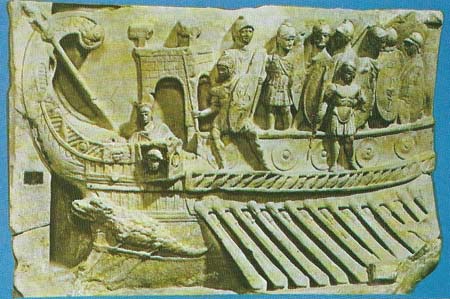
Figure 1. A relief from the Temple of Fortuna Primigenia at Praeneste shows a warship of the 1st century BC with soldiers prepared for hand-to-hand fighting.
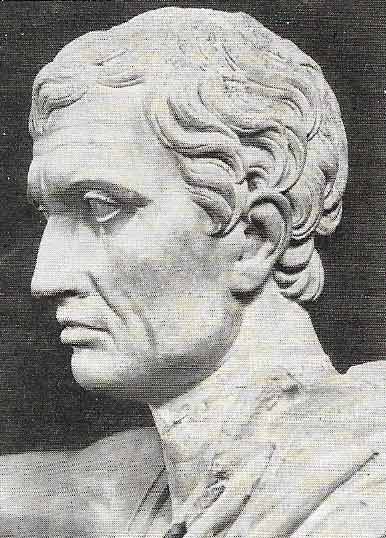
Figure 2. Pompey the Great (Gnaeus Pompeius Magnus) lacked the military genius of Caesar and was less skillful politically. He was however a brilliant administrator and ruthless general who achieved power less by creating opportunities for himself than by waiting for situations to arise in which he would be called on to lead.
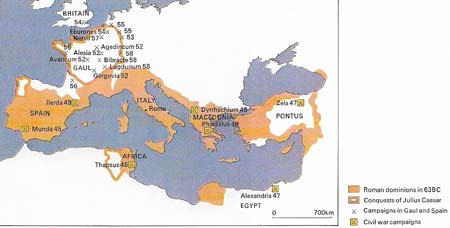
Figure 3. Successful campaigns were waged by Julius Caesar between 58 and 51 BC against the Helvetii, Belgae, Veneti, and the Aquitani. He conquered the whole of Gaul and made it a new province, Transalpine Gaul. He twice landed in Britain, near Walmer or Deal in 55 and near Sandwich in 54 BC. The second expedition was on quite a large scale and Caesar penetrated northward beyond St Albans.
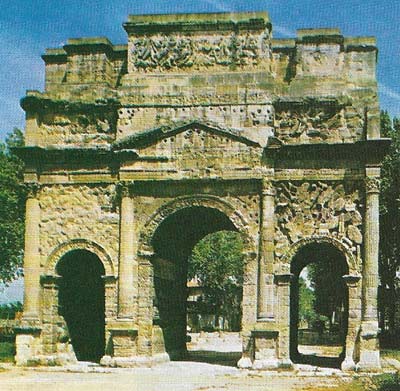
Figure 4. The triumphal arch at Orange, France, is the third largest Roman arch extant. It commemorates Caesar's victories over the Gauls with reliefs of prisoners-of-war and captured armor. The capture of the port of Massilia is commemorated by such designs as anchors, prows, and ropes.

Figure 5. Cleopatra, Queen of Egypt, was the mistress of Caesar and Antony. She bore Caesar a son and followed him to Rome. After Caesar's death, she returned to Egypt, marrying Mark Antony in 37 BC.

Figure 6. A Roman siege tower was divided into several stories and was up to 55 m (180 ft) tall according to the height of the wall to be attacked. It was hauled along a prepared causeway by ropes and capstans. Archers fired on the defenders from the upper stories while on the bottom floor a battering-cane pounded the base of the wall. A boarding bridge could be let down from the top.
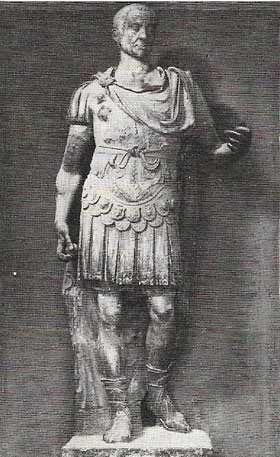
Figure 7. Julius Caesar, born in 100 BC, was the son of a leading patrician family. His aunt was the wife of the popular leader Marius and his own wife, Cornelia, was a daughter of Cinna, Marius' successor. These connections displeased the conservative Sulla and Caesar left Rome. On Sulla's death he returned and made a reputation as a barrister and political orator. Moving up the political hierarchy, he became quaestor in Spain. After Cornelia died, he married Sulla's wealthy granddaughter Pompeia and set out to become a popular party leader. His election as praetor for 62 BC provided a springboard for his swift rise to absolute power in Rome.
The period between about 100 BC and 42 BC, leading up to the fall of the Roman Republic and its replacement by the Roman Empire, was one of disorder and disunity in which ambitious men used ruthless methods in their efforts to secure or maintain dominance. Julius Caesar (100–44 BC) was the outstanding figure but Marius, Sulla and Pompey all contributed to the end of the old form of government.
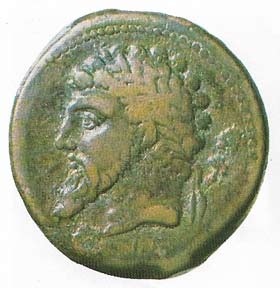 |
>
| Jugurtha, grandson of Masinissa, seized the throne of Numidia in 112 BC, killing several Romans in the process. Rome sent an army against him but the war dragged on in spite of some Roman successes. Marius, who became consul in 108 BC, led an army enlisted from the poor of Rome to Africa and defeated Jugurtha. After being exhibited as part of Marius' triumph, Jugurtha was strangled. |
Political conflicts
In 108 BC Marius, champion of the popular party against undue senatorial power, was elected to the first of his seven consulships. An outstanding general, he proved less skillful as a politician and his influence began to wane. In 90 BC a new popular leader, Drusus, revived advocacy of an extension of citizenship to all Italians. His murder precipitated the Social War in which Rome was hard pressed by a rising of its allies, finally triumphing only by conceding most of the allies' demands.
The popular cause was left in some dis-array. When most of the Eastern Empire rebelled under the lead of Mithridates (c. 133–63 BC), king of Pontus, command of the campaign of suppression was given to Sulla (138–78 BC), an aristocrat (Fig 3). The popular party had the command transferred to Marius but Sulla forthwith marched on Rome, forcing Marius to flee. He pushed through measures against his opponents, then left for the East. Marius returned and began a slaughter of political enemies.
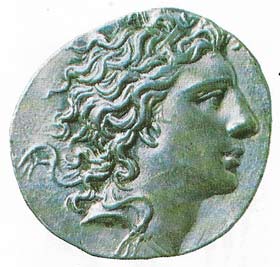 |
>
| Mithridates VI, King of Pontus, controlled the Crimea and much of southern Russia. In 88 BC he began a struggle against Rome that was to last for 25 years. He occupied Asia Minor and invaded Greece before making peace with Sulla. A second war in 83 BC was soon ended but a third Mithridatic war lasted from 74 to 66 BC, when Pompey made Pontus and Bithynia a Roman province. Mithridates killed himself when his son Pharnaces led an uprising against him. |
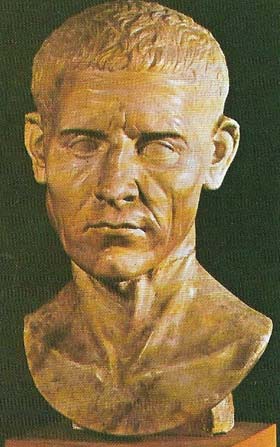 |
>
| Lucius Cornelius Sulla made his military reputation in the Social War. Elected consul in 88 BC, he received the command against Mithridates. Later he used the office of dictator to massacre his opponents and force through pro-Senate legislation. He reformed the criminal law setting up quaestiones (new courts for particular crimes). |
Sulla returned to Italy from the East in 83 BC and with the help of two powerful commanders, Pompey (106–48 BC) and Crassus (c. 115–53 BC), fought his way to Rome. There he began a reign of terror, massacring his opponents and making himself dictator. He drastically reduced the powers of the tribunes and the consuls and increased those of the Senate, but after he resigned in 79 BC the inability of the Senate to use its powers effectively was revealed. Corruption grew, particularly in the provinces. In Spain, Pompey fought a long campaign against Sertorius, a supporter of Marius. Meanwhile Spartacus (died 71 BC) led a slave uprising, terrorizing southern Italy for two years.
Pompey and Crassus joined forces to gain control of Rome, securing their illegal election as consuls in 70 BC. They soon swept away Sulla's legislation favoring the Senate and pinned their colors to the populist mast. Pompey demonstrated his military and organizational ability by speedily clearing the eastern Mediterranean of the growing menace of piracy. In 66 BC he was given virtually a free hand in the East.
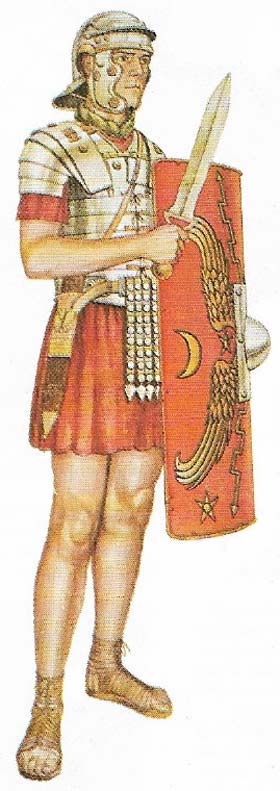 |
>
| Standard equipment of a legionary in the later republican period was a gladium (short sword) and a scutum (shield). |
The First Triumvirate
On his return Pompey received a cold reception from the Senate and he joined with Crassus and Julius Caesar (Figure 7), who had returned from governing Spain, in forming the First Triumvirate. They forced through legislation by appealing to the Assembly over the heads of the Senate. Pompey received approval of his Eastern settlement and Caesar, after his consulship in 59 BC, was granted command in Gaul for five years.
In 55 BC Pompey and Crassus were consuls while Caesar received a five-year extension of his command. Crassus disappeared from the scene when an ill-conceived attack on Parthia ended with his death at the disastrous Battle of Carrhae. Pompey received Spain as his province but preferred to stay in Rome, intriguing with his supporters against Caesar, whose successful campaigns in Gaul (Figures 3 and 4) were proving an embarrassment. Caesar, having conquered the whole of Gaul and made two exploratory invasions of Britain, was now ready to return to Rome backed by his devoted legions.
After fruitless attempts to reach a compromise or reconciliation, the Senate in 49 BC ordered Caesar to disband his army. Caesar at once crossed the Rubicon, the river dividing his province from Italy, and marched on Rome, so plunging Italy into civil war. Pompey hastily left for Greece, hoping to mobilize the resources of the East. Caesar soon mastered Rome and went on to crush forces favorable to Pompey in Spain, to defeat Pompey himself at Pharsalus in Thessaly in 48 BC, and finally to pursue him to Egypt where Pompey was murdered. Delaying his campaign, Caesar began his celebrated affair with the Egyptian queen, Cleopatra VII (69–30 BC) (Figure 5). But within two years he controlled Roman Africa. Finally he sealed his authority by quelling a revolt by Pompey's sons in Spain.
End of the republic
The main basis of Caesar's authority was the office of dictator, which he held twice before receiving it for ten years in 47 BC. He packed the Senate with his supporters, nominated some of the magistrates and although denying any ambition for kingship, finally accepted the dictatorship for life. Brutus (85–42 BC) and Cassius (died 42 BC) organized his assassination at a Senate meeting on 15 March 44 BC. They hoped to save the republic but it had been fatally weakened: the only question was who would be Rome's first emperor. Mark Antony (c. 83–30 BC), Lepidus (died 13 BC) and Octavian (63 BC–AD 14), Caesar's heir, were the three contestants. In 43 BC they formed the Second Triumvirate, issuing proscriptions for the deaths of many. Caesar's death was avenged when Octavian and Antony defeated Brutus and Cassius at Philippi in 42 BC. Octavian was soon to become sole ruler.
